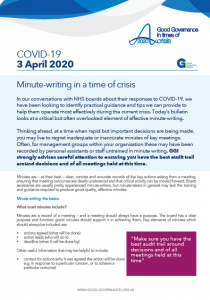Minute-writing in a time of crisis
03 April 2020

In our conversations with NHS boards about their responses to COVID-19, we have been looking to identify practical guidance and tips we can provide to help them operate most effectively during the current crisis. Today’s bulletin looks at a critical but often overlooked element of effective minute-writing.
Thinking ahead, at a time when rapid but important decisions are being made, you may live to regret inadequate or inaccurate minutes of key meetings. Often, for management groups within your organisation these may have been recorded by personal assistants or staff untrained in minute writing. GGI strongly advises careful attention to ensuring you have the best audit trail around decisions and of all meetings held at this time.
Minutes are – at their best – clear, concise and accurate records of the key actions arising from a meeting, ensuring that meeting outcomes are clearly understood and that critical activity can be moved forward. Board secretaries are usually pretty experienced minute-writers, but minute-takers in general may lack the training and guidance required to produce good-quality, effective minutes.
Minute writing: the basics
What must minutes include?
Minutes are a record of a meeting – and a meeting should always have a purpose. The board has a clear purpose and function: good minutes should support it in achieving them. Key elements of minutes which should always be included are:
- actions agreed (what will be done)
- action leads (who will do it)
- deadline (when it will be done by)
Other useful information that may be helpful to include:
- context for actions (why it was agreed the action will be done e.g. in response to a particular concern, or to achieve a particular outcome)
- points of concern or discussion (e.g. ‘members asked why the issue had not been flagged sooner’, ‘members discussed whether further action was needed’ etc.)
What not to include:
- unnecessary detail
- repetition of information found in meeting reports, unless this provides context to the discussion
How do I produce minutes as a minute-taker?
There are four key elements to producing a good quality minute:
1. Preparation: Try to liaise with the meeting chair beforehand to understand their expectations. Read papers and previous minutes where available to help your understanding of what is likely to be discussed. Review previous actions. Sit next to the chair during the meeting so that you can discreetly clarify any key points if necessary.
2. Listen: Don’t aim to write down everything that is said. Listen to the discussion and seek to summarise the key points raised. Ensure you know who is saying what.
3. Record: Ensure you make a note of attendees and any apologies. Use a minute template (see below for a very basic example). Don’t expect to record everything, focus on key words and information, particularly around actions. If something is unclear and you cannot ask for clarification at the time, make a note to check the information later. Record items discussed in the order of the agenda, not the order of discussion if that is different (for example, if an item is brought forward for scheduling reasons).
4.Write up: Focus on clarity: would someone who did not attend the meeting understand what you’ve written? Prioritise actions. Check your work for errors, and/or get someone else to review it for you.
What can I do as chair?
- Make sure actions are clear. Summarise the proposed action verbally following board discussion to ensure members are in agreement and there is clarity. Ensure that an action lead is identified and, where possible, agree a deadline.
- Give your board secretary/minute-taker a clear steer on your expectations of the style of minute that should be provided. Many NHS boards currently receive long verbatim-style minutes. There are advantages to this approach (they provide more comprehensive information etc.) but they are also time-consuming to produce and to read, difficult to turn around quickly, and key information may get lost in the text. In the current crisis, time is of the essence. Chairs should therefore consider whether shorter, more action-led minutes are most helpful to board members.
- If you have a new minute-taker, ask all members to introduce themselves round the table, so the minute-taker knows who is speaking and can attribute remarks where appropriate.
GGI is currently offering an advisory service free of charge to all public sector organisations and their boards. If you have any specific questions on minute-writing please call us on 07732 681120 or email us at advice@good-governance.org.uk with brief details of your question and we will aim to respond to you within 24 hours.
If you would like more in-depth support on minute-writing, GGI can provide a bespoke training service, tailored to your organisation and staff, on how to produce effective, purposive minutes. Contact Sophie Melton Bradley at sophie.meltonbradley@good-governance.org.uk for more information.
Download an example of minutes template.

